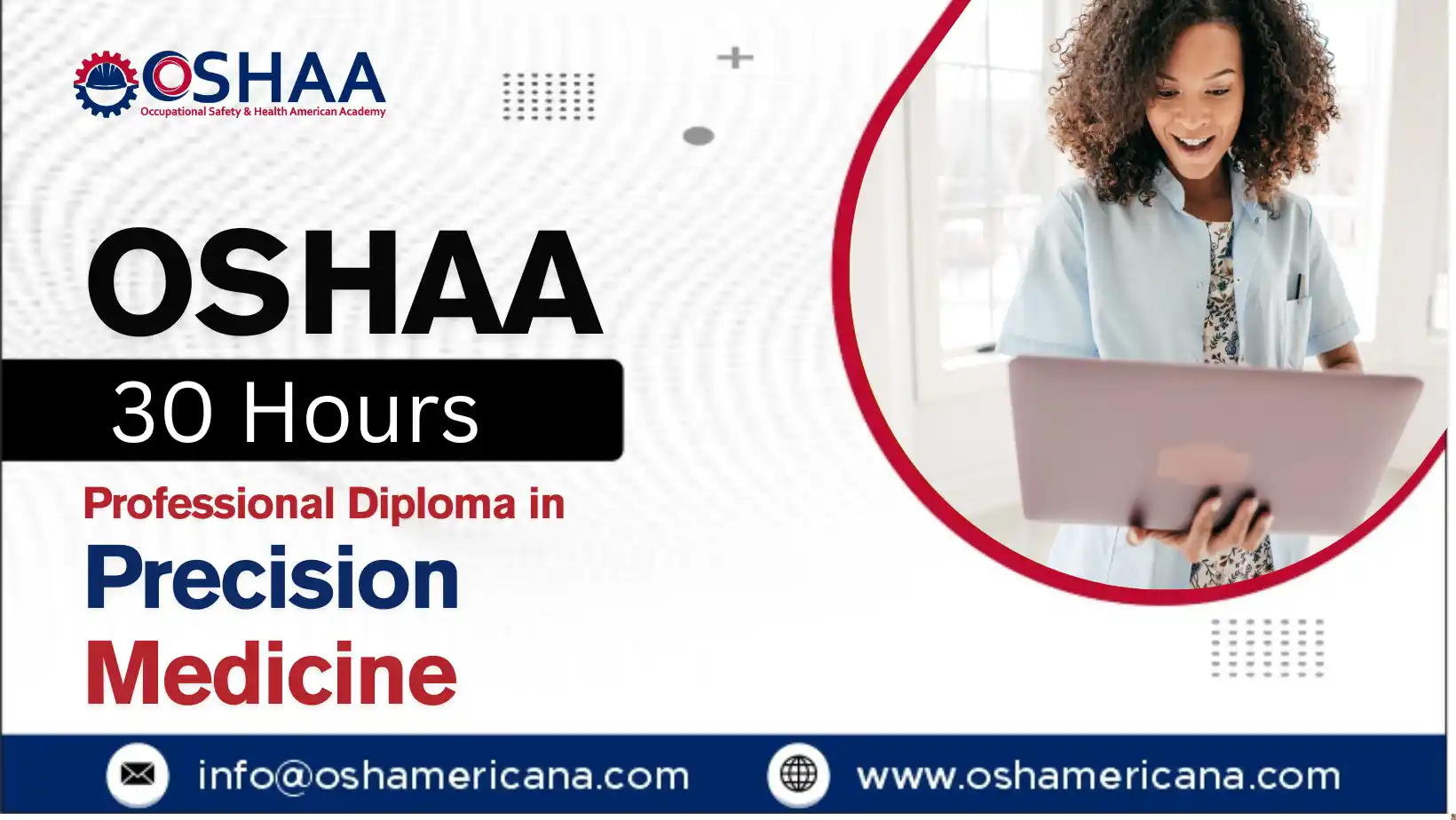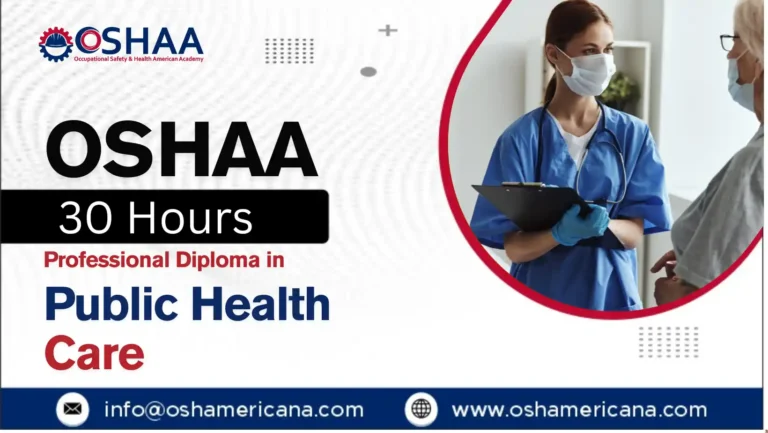Unlock the Power of Precision Medicine with Professional Diploma
The OSHAA 30-Hours Professional Diploma in Precision Medicine provides a forward-thinking, professional qualification designed to equip healthcare and life science practitioners with essential knowledge and practical skills in personalised medicine. This dynamic course introduces participants to the principles, technologies, and ethical frameworks that drive precision medicine, preparing them for the evolving landscape of modern healthcare.
Precision medicine tailors prevention, diagnosis, and treatment based on individual genetic, environmental, and lifestyle factors. The diploma covers core areas including genomic sequencing, biomarker identification, pharmacogenomics, and the use of big data to inform clinical decision-making. Participants learn how personalised approaches can improve treatment effectiveness, reduce adverse effects, and support cost-efficient healthcare delivery.
The programme also explores ethical, legal, and social considerations, such as data privacy, patient consent, and equitable access to care. Through a multidisciplinary lens, it highlights collaboration between clinicians, researchers, technologists, and policymakers to implement effective, patient-centred healthcare solutions.
On completion, participants will be equipped to contribute meaningfully to research, clinical practice, biotechnology, and public health. This diploma empowers professionals to lead innovation, apply data-driven strategies, and enhance patient outcomes in the rapidly advancing field of precision medicine.
OSHAA 30-Hours Professional Diploma in Precision Medicine
Study Units
Learning Outcomes
Introduction to Precision Medicine: Concepts and Scope (3 Hours)
- Define precision medicine and distinguish it from traditional healthcare approaches
- Understand the evolution and scope of personalised medicine in clinical practice
- Identify the key components that enable precision medicine, including genomics and data analytics
- Recognise the potential benefits and limitations of implementing personalised healthcare
Genomics and Genetic Variability in Healthcare (4 Hours)
- Understand the role of genomics in disease prevention, diagnosis, and treatment
- Explore the impact of genetic variation on individual health outcomes
- Interpret basic genomic data in the context of personalised care
- Examine the clinical utility of genomic testing and its integration into healthcare systems
Biomarkers and Molecular Diagnostics (6 Hours)
- Define biomarkers and their significance in early disease detection and treatment planning
- Understand the types of biomarkers used in precision medicine
- Explore molecular diagnostic techniques including PCR, sequencing, and microarrays
- Evaluate the reliability, validity, and ethical use of biomarker testing in clinical decision-making
Pharmacogenomics and Personalised Drug Response (4 Hours)
- Explain how genetic variation affects drug metabolism and efficacy
- Understand the role of pharmacogenomic testing in preventing adverse drug reactions
- Apply pharmacogenomic principles to support personalised treatment plans
- Explore real-world examples of gene-drug interactions in clinical settings
Big Data, Artificial Intelligence, and Predictive Modelling (3 Hours)
- Understand how large-scale data sets are used in precision medicine
- Explore the role of artificial intelligence in disease prediction and patient profiling
- Assess the strengths and limitations of predictive models in clinical decision-making
- Identify the skills and tools needed to interpret data-driven healthcare insights
Clinical Applications in Oncology, Cardiology, and Rare Diseases (4 Hours)
- Examine how precision medicine is applied in cancer diagnostics and targeted therapies
- Understand the use of genetic profiling in managing cardiovascular conditions
- Explore the relevance of genomic research in diagnosing and managing rare diseases
- Analyse case studies demonstrating clinical benefits of personalised care
Ethical, Legal, and Social Implications of Precision Medicine (4 Hours)
- Identify key ethical considerations in personalised healthcare delivery
- Understand legal responsibilities related to the use of genetic and health data
- Explore issues of equity, access, and discrimination in precision medicine
- Evaluate public concerns and societal impacts of personalised health interventions
Data Privacy, Consent, and Health Information Governance (2 Hours)
- Understand the importance of data protection in handling genetic and medical information
- Explore consent processes specific to genomic testing and data sharing
- Identify best practices in health information governance and record management
- Apply legal and ethical principles to ensure confidentiality and informed participation
Course Benefits – OSHAA 30-Hours Professional Diploma in Precision Medicine
- Gain a comprehensive understanding of the principles and practices of precision medicine
- Develop the ability to interpret genomic data and apply it to patient-centred care strategies
- Strengthen knowledge of biomarkers, molecular diagnostics, and their role in early detection and targeted treatment
- Understand the impact of pharmacogenomics on drug selection, dosing, and patient safety
- Learn how big data and artificial intelligence are transforming clinical decision-making
- Explore real-world applications of personalised medicine in oncology, cardiology, and rare disease management
- Enhance professional awareness of the ethical, legal, and social challenges in genomic healthcare
- Improve understanding of health information governance, consent, and data privacy requirements
- Equip yourself with a future-focused qualification aligned with developments in biomedical science and healthcare innovation
- Expand career opportunities in clinical care, research, biotechnology, and public health policy through a recognised and industry-relevant diploma
The OSHAA 30-Hours Professional Diploma in Precision Medicine is designed for individuals seeking to advance their understanding of personalised healthcare and its practical application in clinical and research settings. This course is particularly suitable for:
- Healthcare professionals aiming to integrate precision medicine into patient care
- Clinical researchers and biomedical scientists involved in genomics, diagnostics, or drug development
- Pharmacists and pharmacology professionals exploring personalised approaches to medication
- Public health specialists interested in data-driven, population-specific healthcare strategies
- Healthcare policy advisors and managers supporting innovation in service delivery
- Laboratory and diagnostic technicians working with genetic and molecular tools
- Individuals in biotechnology or health technology roles contributing to personalised care solutions
- Anyone seeking a foundational qualification in precision medicine aligned with modern medical practice
This diploma supports professionals across healthcare, science, and policy by equipping them with the skills and insight needed to implement, evaluate, and advocate for precision-based approaches in diverse health environments.







